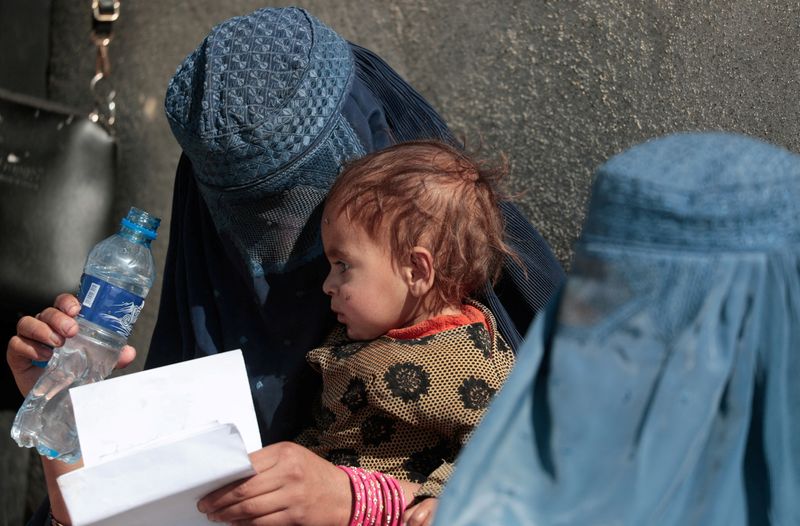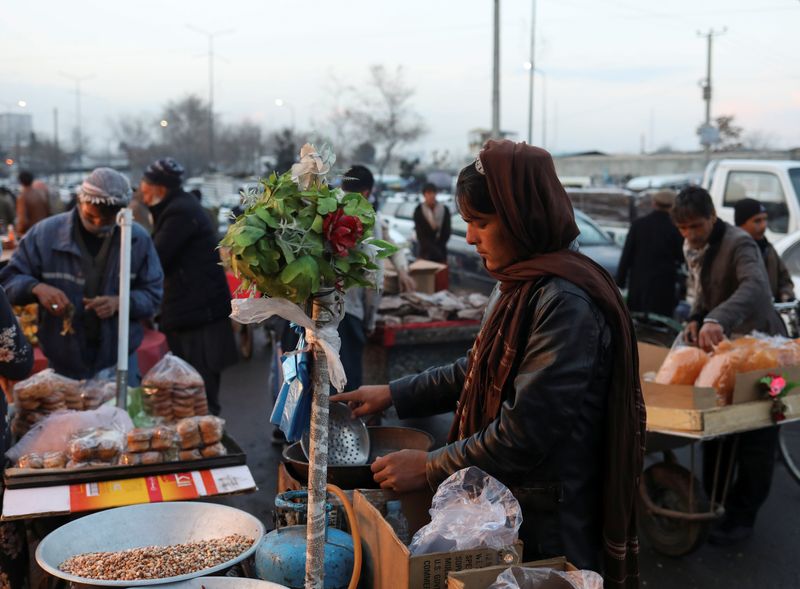By Andrea Shalal and Doina Chiacu
WASHINGTON (Reuters) - The United States is seeking to free up half of the $7 billion in frozen Afghan central bank assets on U.S. soil to help the Afghan people while holding the rest to possibly satisfy terrorism-related lawsuits against the Taliban, the White House said on Friday.
President Joe Biden signed an executive order to deal with the threat of an economic collapse in Afghanistan, setting wheels in motion for a complex resolution of competing interests in the Afghan assets.
The U.S. Justice Department is due on Friday to present a plan to a federal judge on what to do with the frozen funds amid urgent calls from U.S. lawmakers and the United Nations for the money to be used to address the economic crisis that has worsened since the Taliban's takeover in August.
Senior U.S. administration officials said they would work to ensure access to $3.5 billion of the assets - which stem mainly from aid to Afghanistan over the past two decades - to benefit the Afghan people.
They said Washington would set up a third-party trust to administer the funds for which details were still being worked out.
The multi-step plan calls for the other half of the funds to remain in the United States, subject to ongoing litigation by U.S. victims of terrorism, including relatives of those who died in the Sept. 11, 2001, hijacking attacks, the officials said.
Washington froze the Afghan funds after the Taliban's military takeover, but has faced pressure to find a way to release the money without recognizing the new administration, which says it is theirs.
Suhail Shaheen, the Taliban’s designated representative to the U.N., called for the entire amount to be unfrozen and kept under control of the Afghan central bank.
"The reserve is the property of Da Afghanistan Bank and by extension, the property of the people of Afghanistan," Shaheen told Reuters.
The spokesman of the Taliban’s Doha office blasted the U.S. move in a tweet: "Stealing and takeover of frozen money which belongs to the Afghan people by U.S. shows the lowest level of human and moral decline of a country."
The plans also prompted an angry response from some families of Sept. 11 victims, who are seeking to cover unsatisfied court judgments related to the attacks that killed nearly 3,000 people.
Brett Eagleson, the son of one victim, said the U.S. government should ensure the equal treatment of all family members of those killed by ordering the $3.5 billion to be distributed via an existing fund, instead of leaving it up to the court to potentially favor a small subset of families.
"Any mechanism that treats some victims’ families as less deserving or that prioritizes some victims over others is an insult to the memories of those victims of this mass murder," he said.
WORKING WITH UN
Biden's new executive order requires U.S. financial institutions to transfer all Afghan central bank assets held into a consolidated account at the Federal Reserve Bank of New York.
Afghanistan has another $2 billion in reserves held in other countries. Most of those funds are also frozen.
The United States, the largest single donor of humanitarian aid in Afghanistan, also plans to keep working with the UN and humanitarian aid groups on separate U.S. aid flows, the officials said, adding that they expected significant multilateral engagement in creation of the new trust fund.
The UN, which has repeatedly called for the release of Afghanistan's frozen assets, said it was encouraged by Friday's step
However, "it's also important to reiterate that humanitarian assistance alone will be insufficient to meet the tremendous needs of Afghan women, men and children over the long term," UN spokesman Stephane Dujarric said.
Washington is also working closely with the UN to ensure the international body's agencies and aid groups have the liquidity needed to support critical humanitarian assistance programs, the White House said.
Reuters reported on Thursday that the UN aims to kickstart a system to swap millions of aid dollars for Afghan currency that would help solve that issue.

U.N. Secretary-General Antonio Guterres has called for a mechanism https://www.reuters.com/world/asia-pacific/un-chief-appeals-release-money-save-afghan-lives-2022-01-13 to free up about $9.5 billion in frozen Afghan reserves, including in the United States.
U.S. sanctions ban financial business with the Taliban, but Washington has granted waivers to allow humanitarian support for the Afghan people.
